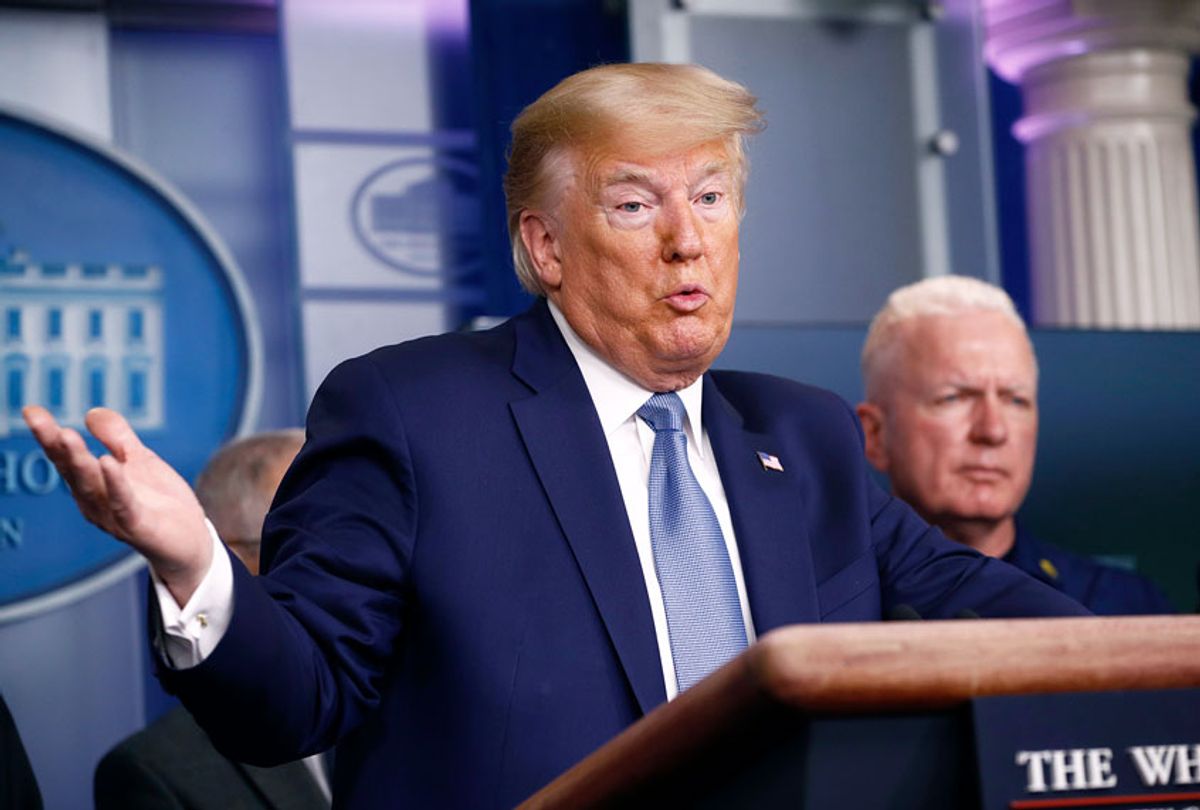President Donald Trump on Tuesday named a long list of executives and business leaders to a White House coronavirus economic advisory council, but he apparently did not give them a head's up first.
Trump announced that he would form several "Great American Economic Revival Industry Groups" and read off a long list of agriculture executives, bankers, labor leaders, defense contractors, energy firms, health care executives, restaurateurs and other business leaders.
But many of the people on the list did not learn that they were part of the White House effort until they heard their names read on TV, The Daily Beast reported. Out of 20 members contacted by the outlet, only two said they weren't caught off guard by the announcement.
Even longtime Trump advisers like Art Laffer, a prominent conservative economist, and Stephen Moore, a so-called economist at the Heritage Foundation, said they did not expect to be named.
"I was not watching TV at the time," Laffer said. "I found out about it [yesterday] when three to five friends started calling me to ask me about it."
The union leaders touted by Trump were also surprised they were named.
Tim Schlittner, the communications director for the AFL-CIO, told the outlet that the union only learned of chief Richard Trumka's supposed involvement during the announcement, adding that it received "what appeared to be a mass email with instructions to RSVP" for a conference call on Wednesday.
"There was no call from President Trump to President Trumka on this," he said. "President Trumka is calling in to see if this is a serious effort or not."
Some of the executives were so blindsided they were unable to participate in Wednesday's calls, according to Politico. Goldman Sachs CEO David Solomon skipped the discussion to participate in a quarterly earnings call, while executives at JPMorgan Chase were unable to track down CEO Jamie Dimon.
One executive who participated in the call described it to the outlet as a "sh*t show." Others pushed back on Trump's calls to quickly lift coronavirus restrictions in order to reopen the economy.
"I really don't understand how they are communicating on this," one executive told Politico. "He's got to stop talking about turning the economy back on and start talking about making people feel safe, things that are happening around testing and the health care system. That's the only way you will really get the economy reopened over a period of time."
Trump claimed Wednesday that the participants of the calls were "all-in on getting America back to work — and soon." But Teamsters union chief James Hoffa said in a statement that he told Trump directly that there needed to be more reliable testing, better access to protective equipment and government regulations in place to begin reopening the economy.
"Until we can ensure worker safety, we cannot put our members and workers at further risk by opening the economy up too soon," he said. "It's important that we listen to the medical professionals to ensure that the health and safety of workers and their families is our first priority."
Many other participants echoed Hoffa's warnings.
"The people involved in the first call . . . described current testing levels in the U.S. as inadequate to effectively reopen the economy," The Wall Street Journal reported, arguing that the public needed to see more progress, because they "would be confident enough to return to work, eat at restaurants or shop in retail establishments."
Blackrock CEO Larry Fink told CNBC that it was unfeasible to reopen in the coming weeks.
"We're going to still see elements of the disease increasing in other parts of the world, and until we have adequate testing — rapid testing — it's very hard to see how we're going to reboot in the next 30 days," he said. "I do believe we'll be able to reboot. I do believe we're going to have a better, more normalized environment. But it may not be in June or July. It may be in August."
Amazon CEO Jeff Bezos, who also participated in the call, said in his annual shareholder letter this week that it was impossible to "get the economy back up and running" without mass testing.
"Regular testing on a global scale, across all industries, would both help keep people safe and help get the economy back up and running," he said. "For this to work, we as a society would need vastly more testing capacity than is currently available."



Shares